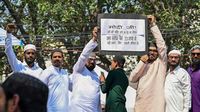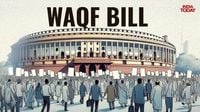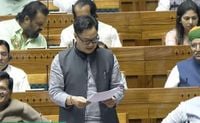NEW DELHI: On April 2, 2025, the Lok Sabha witnessed a heated debate as the central government tabled the Waqf (Amendment) Bill, 2025, amid strong opposition. Union Minister for Minority Affairs, Kiren Rijiju, introduced the bill, which aims to amend the Waqf Act of 1995, asserting that it will enhance the administration and management of Waqf properties across India.
The proposed legislation has sparked significant controversy, with the opposition labeling it as "unconstitutional" and "discriminatory" against Muslims. The Bharatiya Janata Party (BJP)-led government, however, argues that the bill is necessary to address the challenges faced in managing Waqf properties, which are dedicated exclusively for religious or charitable purposes under Islamic law.
The Waqf (Amendment) Bill, 2025, is a revised version of the Waqf (Amendment) Bill, 2024, which was first introduced in the Lok Sabha on August 8, 2024. After extensive scrutiny by a Joint Parliamentary Committee (JPC), the bill has undergone several amendments, incorporating 25 recommendations aimed at improving its effectiveness.
According to the government, the bill seeks to update the definitions of Waqf, improve the registration process, and leverage technology to streamline the management of Waqf properties. Currently, Waqf Boards oversee approximately 8.7 lakh properties across 9.4 lakh acres, making them one of the largest landowners in India.
Key features of the amendment include renaming the Waqf Act to the Unified Waqf Management, Empowerment, Efficiency, and Development Act, 1995, and allowing for the inclusion of non-Muslims in the Waqf boards. Specifically, the bill proposes that two out of 22 members in the central Waqf council and two out of 11 members in state Waqf boards can be non-Muslims.
Despite these proposals, opposition leaders, including Congress's Rahul Gandhi and NCP's Supriya Sule, have expressed strong disapproval. They argue that the bill undermines the authority of Waqf boards by transferring powers to district collectors, who will now have the authority to determine whether a disputed property qualifies as Waqf.
Congress MP Kiran Kumar Chamala stated, "The opposition will oppose the bill if it tries to de-establish a particular community," highlighting concerns that the legislation could erode the rights of Muslim communities in managing their properties.
Furthermore, the bill aims to digitize Waqf property management through a centralized digital portal. This initiative is expected to improve tracking, identification, and oversight of Waqf assets, ensuring greater transparency and accountability. The government anticipates that these measures will prevent financial mismanagement and illegal occupation of Waqf lands, ultimately benefiting economically disadvantaged communities through increased funding for healthcare, education, and housing.
The debate in the Lok Sabha is set to last for eight hours, with the ruling party urging its members to support the bill. The BJP has a significant majority, with 240 MPs in the Lok Sabha, and needs 272 votes to pass the bill.
Despite the government's confidence, the opposition bloc, known as the Indian National Developmental Inclusive Alliance (INDIA), has vowed to resist the bill. They argue that the proposed changes centralize control over Waqf properties and infringe upon minority rights. AAP's three-line whip instructed its MPs to be present during the debate, emphasizing the importance of their stance on the bill.
Rijiju defended the bill, stating, "The consultation process of the Joint Parliamentary Committee was the largest ever exercise carried out by a parliamentary panel in India's democratic history." He noted that over 97.27 lakh petitions and memorandums were received, reflecting widespread public engagement with the proposed changes.
However, opposition members have criticized the government for what they perceive as a lack of consensus-building around the bill. Congress MP Gaurav Gogoi remarked, "This bill is an assault on the Constitution. It aims to defame minorities and defranchise them."
In response to the opposition's concerns, Union Home Minister Amit Shah emphasized the importance of the JPC process, stating, "We have a democratic committee, which discusses and deliberates on the basis of discussions and makes changes." He argued that the amendments are in the best interest of all citizens, including Muslims.
As the Lok Sabha prepares for this contentious debate, the outcome remains uncertain. The BJP's ability to maintain coalition support and navigate opposition resistance will be crucial in determining whether the Waqf (Amendment) Bill, 2025, will be passed into law.
The political landscape surrounding this bill reflects broader tensions within Indian society regarding minority rights and the management of religious properties. As the government pushes forward with its agenda, the implications for community governance and religious freedoms are under intense scrutiny.








